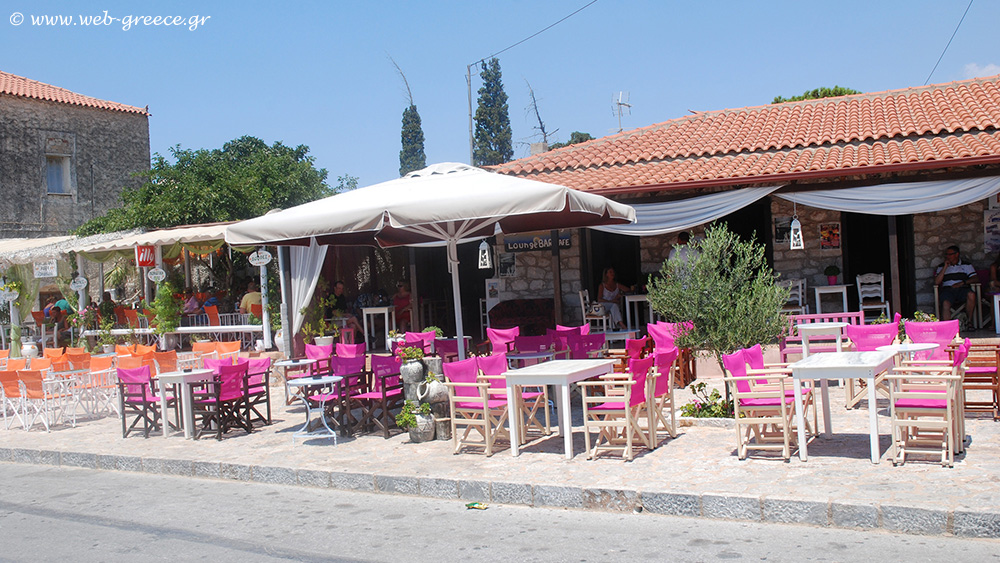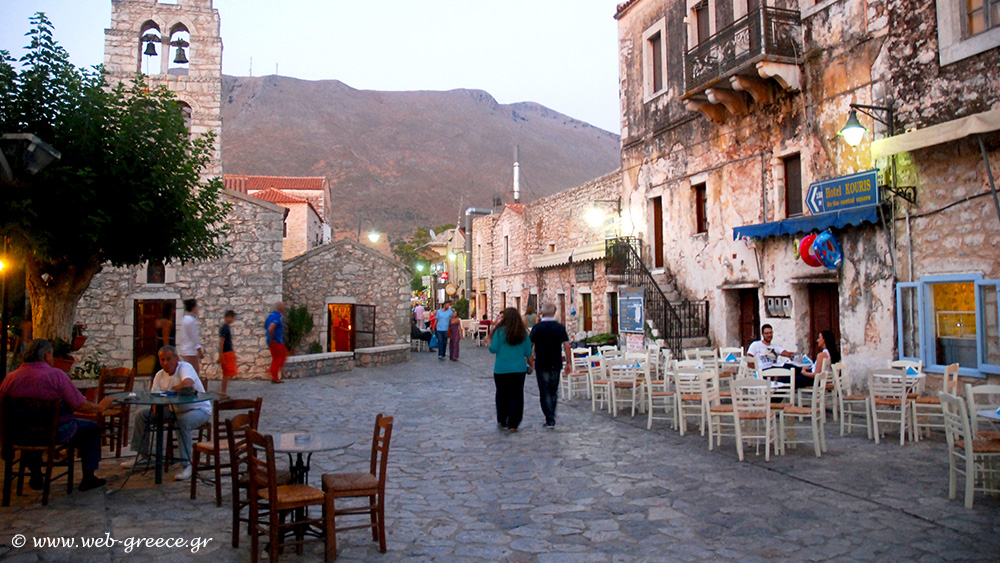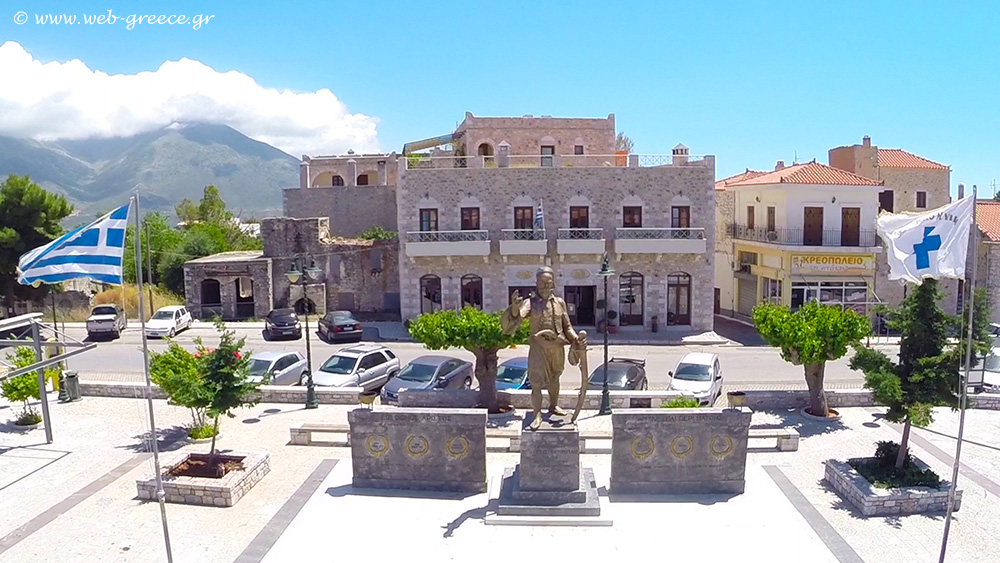Remembering One Hot Summer in Areopolis ~ Joy, Spiders, and Bemused Tourists
 Wednesday, September 12, 2018 at 8:12PM
Wednesday, September 12, 2018 at 8:12PM Years ago I had a friend who owned a small house in Areopolis, Greece. I once spent a month there by myself. I spent a lot of time sitting in a taverna called Estiatopion writing in my journal.
Areopolis was hot. As I sat in a taverna on the piatsa I knew just how hot. The taverna was called the Estiatopion. It was owned and run by a family and a young girl served me as often as not. I would discover that her name was Joy in English. She found my name interesting and was utterly curious about me. She asked in broken English, what I was doing and, as best I could, I explained I was writing down in a journal what I was seeing and experiencing and that she was now in my journal as well. When she finally understood, she was thrilled and beautifully self-conscious.
 AreopolisI sat drinking retsina taken from a large wooden barrel in the kitchen and served in an orange aluminium half pint pitcher, old, chipped, and dented. Before me, on the railing of the taverna, was a spider weaving its evening web. I could not see the web itself nor where it was attached to the railing. It seemed the spider hung in mid-air, oblivious to the demands of gravity. It was, nonetheless, busy, creating invisible and dangerous threads.
AreopolisI sat drinking retsina taken from a large wooden barrel in the kitchen and served in an orange aluminium half pint pitcher, old, chipped, and dented. Before me, on the railing of the taverna, was a spider weaving its evening web. I could not see the web itself nor where it was attached to the railing. It seemed the spider hung in mid-air, oblivious to the demands of gravity. It was, nonetheless, busy, creating invisible and dangerous threads.
From my table I looked out upon the open piatsa. To my left was one of the twenty churches in Areopolis, small, attractive, well taken care of, and open. I wondered what purpose it served here on the public plaza. Perhaps just the purpose of being taken care of. Perhaps witness.
As I poured more retsina into a small glass, the spider finished its construction and sat quietly and patiently in the middle of its web. Joy came from inside the taverna with my bread, tzatziki and salad. As a gift she brought me watermelon. She seemed to like me, and that was welcomed. The spider made its first catch, a small gnat, the very kind that liked to swim along the surface of my retsina. A little girl passing in front of the church crossed herself three times. In the piatsa boys played football, young men strutted their stuff, and young girls tossed their hair. At a table to my right a grandfather ate with his grandson, demonstrating such tenderness toward the boy that it almost brought tears to my eyes.
 AreopolisThe next day Areopolis was hotter still and I returned to the Estiatopion. Joy brought me a frappe without my asking. The Estiatopion was one of five tavernas in a row facing the piatsa. To the right was Nicola's Corner. Interestingly, Nicola's was the second in the row, not on the corner at all. Obviously, Nicola (and I chose to assume there actually was a Nicola) did not want us to read the word "corner" literally. In fact, Nicola demanded that we put aside our Enlightenment and scientific positivistic seductions and deceptions and read corner poetically. If we did not, could not, we missed the whole point, and poor Nicola would turn out looking like a bloody fool. But if we did, well, the word "corner" would evoke all kinds of images, feelings and desires, some of which Nicola's Corner would satisfy. But I mention Nicola's Corner because it was also where the buses stopped. Local buses, Athens buses, tourist buses.
AreopolisThe next day Areopolis was hotter still and I returned to the Estiatopion. Joy brought me a frappe without my asking. The Estiatopion was one of five tavernas in a row facing the piatsa. To the right was Nicola's Corner. Interestingly, Nicola's was the second in the row, not on the corner at all. Obviously, Nicola (and I chose to assume there actually was a Nicola) did not want us to read the word "corner" literally. In fact, Nicola demanded that we put aside our Enlightenment and scientific positivistic seductions and deceptions and read corner poetically. If we did not, could not, we missed the whole point, and poor Nicola would turn out looking like a bloody fool. But if we did, well, the word "corner" would evoke all kinds of images, feelings and desires, some of which Nicola's Corner would satisfy. But I mention Nicola's Corner because it was also where the buses stopped. Local buses, Athens buses, tourist buses.
Opposite Nicola's Corner, across the street, on the actual corner of the piatsa was a small kiosk. Inside the kiosk sat an old woman in black. She sat there all day and late into the night. She sold ice cream, smokes, snacks of all kinds, plastic offensive toy weapons and time on the telephone. You really had to want the time, however. It was expensive.
About half the piatsa was covered with tables and chairs owned by the five tavernas and identified by territory and colour. Whites, yellows, reds, striped large coverings on metal frames, huge white umbrellas all busy until midnight. Also on the piatsa was a statue of the local hero who started a revolution that swept across old Greece.
 Petros MierrokasAreopolis is a town on the Mani Peninsula and the name means the “city of Ares,” the ancient Greek god of war. On March 17, 1821 the Greek War of Independence was started in Areopolis by Petros Mierrokas, the very man now standing frozen in time in the piatsa. Now the children play at the base of Mierrokas’s statue. The weeds grow and the tourists take pictures, though I'm sure they have no idea who the man with the large sword actually was.
Petros MierrokasAreopolis is a town on the Mani Peninsula and the name means the “city of Ares,” the ancient Greek god of war. On March 17, 1821 the Greek War of Independence was started in Areopolis by Petros Mierrokas, the very man now standing frozen in time in the piatsa. Now the children play at the base of Mierrokas’s statue. The weeds grow and the tourists take pictures, though I'm sure they have no idea who the man with the large sword actually was.
As I sat drinking my frappe, a tourist bus arrived in front of Nicola's Corner. From it exited, it seemed to me rather reluctantly, white, limp, camera laden tourists. Some came straight to Nicola's Corner and took a seat. One family ventured up the three steps of Estiatopion. Some walked across the street to the piatsa and took pictures of the local statue. And a few ventured into town.
The centre of Areopolis was to the right of the piatsa perhaps 100 meters down a narrow street. As these few adventurers walked down that street, they passed a post office, a chemist, a couple of old markets selling fruits and vegetables, and a few rather cheap shops selling goods to tourists. At the point where the road narrowed still more, they turned and came back to the bus. There they hovered aimlessly waiting for the bus engine to come to life and the door to open.
Sadly, if they had continued walking, they would have entered the old plaza at the end of the narrow street. They would have walked upon cobbles aching with age and history, the actual place where the local hero began the revolution. They would have seen the old church and the old bakery. If they had had real courage, they would have bent low to pass through the small door of the bakery, tripped over hard bread covering every inch of surface space, and seen an old woman sweeping soot out of an older stone oven with a carbon black cloth on the end of a long wooden pole. Outside the bakery, they would have seen old houses and the famous Mani towers. But instead they returned to their bus.
Copyright © 2018 Dale Rominger
Reader Comments